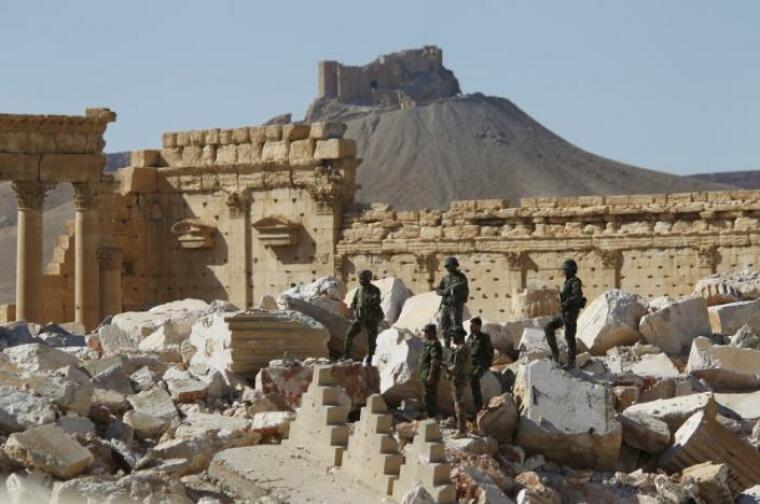Ancient relics survive in Syrian monastery ransacked by ISIS

A priest who escaped from the Islamic State found signs of hope for Syria when found the fourth-century relics in the monastery of Mar Elian were kept safe from the jihadists.
"In Mar Elian, we have always hoped to welcome everyone. Mar Elian was really a sign of hope for the Syrian people," Fr. Jacques Mourad told Catholic News Agency.
He said that everything changed since he was captured by ISIS, but he still plans to rebuild, and he is waiting for the war to end.
Mar Elian, which is located in Al Qaryatayn, had collaborated with Muslim donors to take in hundreds of displaced Syrians and provide for their needs.
"In Mar Elian, we have always hoped to welcome everyone. Mar Elian was really a sign of hope for the Syrian people," said Mourad.
In August last year, ISIS captured and ransacked the monastery and abducted between 160 and 230 Christians and Muslims from the town.
"After the destruction of the monastery, we thought his relics were lost, but instead we were able to find them. This gave us great consolation," the priest recounted.
Al Qaryatayn was liberated from ISIS by Russian-backed Syrian forces in April 2016. The priest said that the Mar Elian's tomb was one of the first things attacked by the terrorists.
"They cannot accept that the cities they seize have places where tombs or relics of saints are kept. They believe that there is no need for a tomb, as once a person passes away, his existence is over on earth," Mourad explained.
In an interview with Western Morning News, he said that the Russians and Syrian forces also bombed a new chapel that he had built in their attempt to drive out ISIS. Mourad and his parishioners were able to flee to safety with the help of his Muslims friends.
Earlier this year, Mourad traveled around Europe and the Americas to highlight the situation in Syria. He said that he was disturbed by the apathy and ignorance displayed by many countries that he visited.
He will be working with his monastic community to help Christian refugees in Kurdistan after mid-December.
 Christians don't have to affirm transgenderism, but they can’t express that view at work: tribunal
Christians don't have to affirm transgenderism, but they can’t express that view at work: tribunal Archaeology discovery: Medieval Christian prayer beads found on Holy Island
Archaeology discovery: Medieval Christian prayer beads found on Holy Island Presbyterian Church in America votes to leave National Association of Evangelicals
Presbyterian Church in America votes to leave National Association of Evangelicals Over 50 killed in 'vile and satanic' attack at Nigerian church on Pentecost Sunday
Over 50 killed in 'vile and satanic' attack at Nigerian church on Pentecost Sunday Ukrainian Orthodox Church severs ties with Moscow over Patriarch Kirill's support for Putin's war
Ukrainian Orthodox Church severs ties with Moscow over Patriarch Kirill's support for Putin's war Islamic State kills 20 Nigerian Christians as revenge for US airstrike
Islamic State kills 20 Nigerian Christians as revenge for US airstrike Man who served 33 years in prison for murder leads inmates to Christ
Man who served 33 years in prison for murder leads inmates to Christ


 Nigerian student beaten to death, body burned over ‘blasphemous’ WhatsApp message
Nigerian student beaten to death, body burned over ‘blasphemous’ WhatsApp message 'A new low': World reacts after Hong Kong arrests 90-year-old Cardinal Joseph Zen
'A new low': World reacts after Hong Kong arrests 90-year-old Cardinal Joseph Zen Iran sentences Christian man to 10 years in prison for hosting house church worship gathering
Iran sentences Christian man to 10 years in prison for hosting house church worship gathering French Guyana: Pastor shot dead, church set on fire after meeting delegation of Evangelicals
French Guyana: Pastor shot dead, church set on fire after meeting delegation of Evangelicals ‘Talking Jesus’ report finds only 6% of UK adults identify as practicing Christians
‘Talking Jesus’ report finds only 6% of UK adults identify as practicing Christians Mission Eurasia ministry center blown up in Ukraine, hundreds of Bibles destroyed: 'God will provide'
Mission Eurasia ministry center blown up in Ukraine, hundreds of Bibles destroyed: 'God will provide' Church holds service for first time after ISIS desecrated it 8 years ago
Church holds service for first time after ISIS desecrated it 8 years ago Burger King apologizes for 'offensive campaign' using Jesus' words at the Last Supper
Burger King apologizes for 'offensive campaign' using Jesus' words at the Last Supper Uganda: Muslims abduct teacher, burn him inside mosque for praying in Christ’s name
Uganda: Muslims abduct teacher, burn him inside mosque for praying in Christ’s name